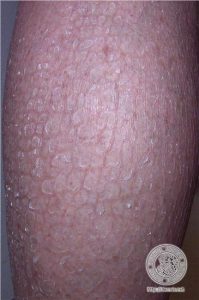SERVICES
- Allergy Screening
- Chemical Peels
- Dermapen
- Facial Skin Analysis
- FreshEyes
- Hyperhidrosis (Excessive Sweating)
- Hair Loss Treatment
- Laser Clinic
- Liquid Facelift
- Keloid Treatments
- Medical Facials
- Medical Treatments
- Mole Mapping
- Photodynamic Therapy (PDT)
- Skincare Advice
- Pigmentation Treatment
- Surgical Procedures
- Ultraviolet Phototherapy
USEFUL LINKS
 Q. What is dry skin?
Q. What is dry skin?
A. Dry skin, also known as xerosis, is a common problem. Your skin needs moisture to stay smooth and supple. A lack of moisture or dehydration of the skin results in dryness of the skin.
Q. How do you recognise dry skin?
A. Dry skin has many forms. The mildest cases can be recognised by a dry look to your skin, some mild flaking of the skin, and a slight tightness in the feel of your skin. More severe cases of dry skin can be accompanied by severe itching, red or white patches of skin, cracking, bleeding, severe tightness, and pain.
Q. What causes dry skin?
A. There are many causes of dry skin:
- When oil glands do not supply enough lubrication to the skin. As a result, the skin becomes dehydrated
- .When skin gets exposed to the elements especially in winter.
- Dry skin could be due to a genetic condition & can run in families e.g Icthyosis Vulgaris
- Poor diet. Nutritional deficiencies, especially deficiencies of vitamin A and the B vitamins, can also contribute to dry skin.
- Environmental factors such as exposure to sun, wind, cold, chemicals, or cosmetics, or excessive bathing with harsh soaps.
- Conditions such as dermatitis, eczema, psoriasis, or seborrhea.
- Dry skin could also be from underlying medical problems e.g. Dry skin can be a sign of an underactive thyroid; Diabetic patients often have dry skin; Certain drugs, including diuretics, antispasmodics, and antihistamines
Q. How can I prevent and treat dry skin?
A. These are a few simple steps to follow.
- Each day when you take your bath or shower, try to use lukewarm water. Hot water dries out the skin. Try to limit your time to fifteen minutes or less in the bath or shower. Bathing should be done no more than once a day. If you bathe too frequently you will remove the natural oils from the skin causing dryness.
- Avoid using harsh soaps that dry the skin. Use a glycerine soap or aqueous cream to bath. Avoid soaps with antibacterial ingredients. A fragrance-free bath oil may be added to the bath water.
- Avoid vigorous use of a washcloth in cleansing. When towelling dry, do not rub the skin. Blot or pat dry so there is still some moisture left on the skin.
- Next apply a good quality moisturizer to the skin. The best time to do this is immediately after a bath or shower so that the moisturizer holds in the moisture from the shower.
- Use a sun block of SPF 15 or more daily on exposed areas.
- Drink plenty of water and other liquids to keep your skin moist from the inside. Take multivitamins and essential fatty acids like flaxseed oil.
Q. Which moisturisers should I use?
A. Use a good quality moisturiser that is fragrance-free and which contains cetamacrogol and urea. Urea is a synthetic compound that acts as a humectant i.e. it helps to lock moisture in the skin. In winter, moisturisers should be greasier. Aqueous cream is actually NOT a good moisturiser for dry skin.
Q. When should I see a Dermatologist?
A. See a doctor if:
- You feel itchy without a visible rash
- Dryness and itching are preventing you from sleeping
- You have any open cuts or sores from scratching
- Home care measures do not relieve your dryness and itching
- You have associated skin disease like eczema & psoriasis or a genetic dry skin condition like Ichtyosis.
Patient Testimonials
EXCELLENTTrustindex verifies that the original source of the review is Google. From my first visit with Dr Jhetam I knew I would go back. He is compassionate , friendly and has an interaction which made you feel comfortable. This is very important in any doctor because our relationship with our doctor is very intimate.Trustindex verifies that the original source of the review is Google. Dr Jhetman is truly one of a kind. Anyone who is fortunate enough to be in his care can so grateful. Academic, informative and reassuring. It’s hard to find a doctor who has this combination of skills these days. He dealt with my Melonoma concerns with swift and professional care. And his staff are equally as competent and caring. I cannot commend Dr Jhetman and his staff enough on true patient care. Thank you!Trustindex verifies that the original source of the review is Google. I was absolutely satisfied with my experience with Dr Jhetham & his winning team. Keep up the good work.Trustindex verifies that the original source of the review is Google. Best skin doctor..Dr Jetham prescribed the best products that have brought so much of a glow to my skin..being a transplant patient and so much happening to my skin just 4 visits to him and my face is back to it's radiance ..I hightly reccomend Dr Jetham ...you won't go wrong..Trustindex verifies that the original source of the review is Google. Dr. Imraan Jhetam and his team provided exceptional care, showcasing professionalism and compassion in every interaction. Dr. Jhetam took the time to thoroughly explain everything, addressing each of my concerns with empathy and understanding. My experience with him was truly wonderful, and I highly appreciate his dedication to patient care.Verified by TrustindexTrustindex verified badge is the Universal Symbol of Trust. Only the greatest companies can get the verified badge who has a review score above 4.5, based on customer reviews over the past 12 months. Read more



